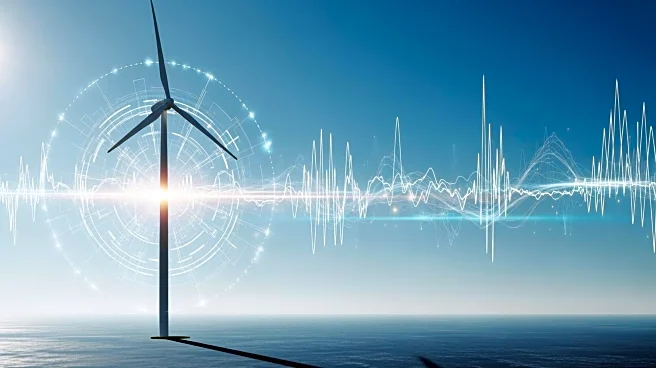What's Happening?
The National Audit Office (NAO) has issued a critical report on the current state of the UK's electricity grid infrastructure, highlighting significant delays in grid connections that could hinder the country's
clean energy goals. The report emphasizes the need for the Department for Energy Security and Net Zero (DESNZ) to expedite the grid connection process to meet the Clean Power 2030 Action Plan. The NAO points out that the value of stalled grid connection projects has increased, with a combined gigawatt value of 889GW in June 2025, up from 714GW in June 2024. Additionally, the report stresses the importance of enhancing battery storage capacity, which is expected to need a fivefold increase by 2030 to support the transition to renewable energy sources.
Why It's Important?
The NAO's findings underscore the critical challenges facing the UK's transition to a clean energy system. The delays in grid connections and insufficient battery storage capacity could impede the country's ability to achieve its target of 100% clean power by 2030. This situation has broader implications for the UK's energy security and its commitments to reducing carbon emissions. The need for substantial public and private investment, estimated at £40 billion, highlights the economic stakes involved. Failure to address these issues could result in continued reliance on fossil fuels, undermining efforts to combat climate change and potentially affecting the UK's leadership role in global clean energy initiatives.
What's Next?
The NAO's report calls for urgent reforms in the planning and approval processes for new energy projects, particularly offshore wind and transmission networks. DESNZ is expected to secure planning permissions for most projects by next year to stay on track with its action plan. The department will also need to address the significant investment requirements and manage the complexities of nuclear decommissioning, which involves long-term liabilities. Stakeholders, including government agencies, energy companies, and investors, will need to collaborate to overcome these challenges and ensure the successful implementation of the UK's clean energy transition.
Beyond the Headlines
The NAO's report highlights deeper systemic issues within the UK's energy infrastructure planning and execution. The complexity and scale of the required grid expansion and battery storage enhancements reflect broader challenges in transitioning to a sustainable energy system. These challenges include balancing economic growth with environmental sustainability, managing technological advancements, and ensuring equitable access to clean energy. The report also raises questions about the long-term viability of current energy policies and the need for innovative solutions to meet future energy demands.









